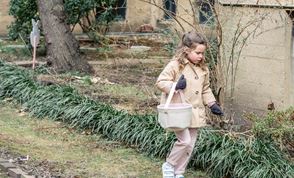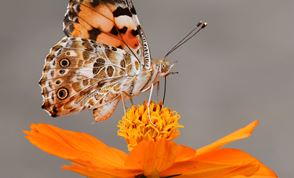9 Ways to support the bees at home

- Fill your garden with pollen and nectar-rich plants
Providing a garden rich in pollen and nectar creates a bee-friendly habitat so that not only do the bees have the resources to thrive but they also have a safe place to visit without being in danger. Even without a garden at your disposal, a simple lavender plant can provide the nutrients needed to help your local bees survive.
- Don’t use garden pesticides
Pesticides are poisonous to bees so avoiding using pesticides in your garden will eradicate hurting our little friends. By following pesticide-free growing techniques means you can still grow your much-loved vegetables without any harm to insects and bees. Find more tips on ways to grow pesticide-free.
- Bee safe & provide a water source for bees to enjoy
Having a water source available to bees deeply benefits the bees' survival rate. Foraging for pollen and nectar throughout the day can be tiring for a worker bee so giving them a safe watering hole is an important step in allowing bees to stay hydrated.
Why not get the kids to fill an old saucer with marbles or a few stones to create a safe place for bees to cool off while getting the water they need to continue their journey.
- Bees love trees
Trees are an incredible source of food for bees, as they can provide hundreds if not thousands of blossoms for bees to feed on. Plus, even hollow trees are useful as they can become shelters and habitats for bees to survive within. To benefit the world and bee community, joining a group or scheme which plants trees in your area could be hugely beneficial to communities and the insects we cherish.
- Keep the weeds
Weeds can be a glorious early season provider of pollen for bees, they can attract swarms of happy bees and other friendly insects. So next time you're considering mowing the lawn or removing garden weeds, leave the dandelions and white clovers in your lawns to support up to 37 species of bees.

- Stop the stigma
Spread the positivity and mood for change with your family and friends to support and protect our bees. These insects can be seen as scary pests flying around, the negative view of the insects may stop many from caring or trying to protect the beautiful species which we cherish.
- Provide shelter
Not all bees have a hive or shelter to live in so why not provide your own? A nesting place could be more important than providing nectar to a native bee so purchasing a bee nesting house not only provides a home to new members of your community but also is a great way to teach children about nature.
- Shop smart and purchase local, bee-friendly honey
Buying local and bee-friendly honey is not only supporting the environment but also local businesses. It can also tackle allergies as the pollen consumed by the bees reduces the amount of pollen in the area; it's a win-win! There are many benefits to buying local honey so think next time you're in the supermarket, and instead go pure!
- Give a tired bee a little help
When out and about, you may find a bee lying around, this means they’re tired or struggling. A great way to give a bee a helping hand is by placing the tired bee onto a flower as they can often require a little help from us to get to the nutrients they need after a long quest for their queen.
For more great activities to protect our nature (as well as keep the kids busy), take a read of some more of our top blogs.






